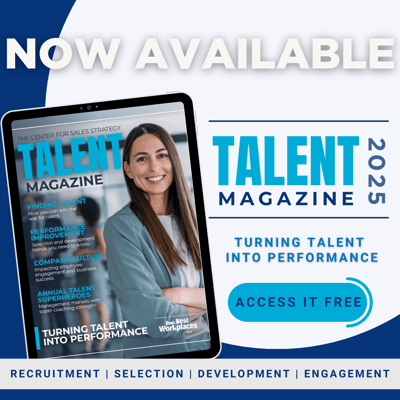
“Why interview if I can’t hire?” This is a frequently asked question this year — and understandably so. Recruiting top sales talent takes time and energy, and it feels pointless if you’re a company experiencing a hiring freeze. Let’s pause there for a minute.
While not under a hiring freeze, college football teams are limited to the number of players that they can have on the roster. However, that doesn’t stop recruiters from scouting more players than their roster can accommodate in search of top recruits. They’re actively recruiting the best talent to build a winning team for future seasons to ensure the best replacement for this season’s graduating players. Plus, they know that not every player to whom they offer a position will accept.
In the business world, the same rules apply. Building a winning legacy depends on having top talent on your staff and top talent ready to join in a moment’s notice. Because we know turnover is inevitable. It isn’t a matter of if it will happen; it’s a matter of when.
Be on a Never-Ending Search for Talent
 The very best people are not looking and are probably not even immediately available. You must cast your net far and wide, talking to talent anywhere, everything, anything, and every time.
The very best people are not looking and are probably not even immediately available. You must cast your net far and wide, talking to talent anywhere, everything, anything, and every time.
Below are four reasons you should always interview to recruit top sales talent — even during a hiring freeze.
1. Maintain and Increase Sales Performance
Strong recruitment means you don’t have to settle for disappointing sales performance from your current team. Not only will you be able to upgrade your staff quickly when under-performers leave, but the knowledge that you have replacements waiting in the wings may even result in your existing team members taking their performance up a notch.
2. Save Yourself Time and Stress
According to HubSpot, the average annual turnover for sales teams is around 27%. This means if you have 10 reps, you could lose three of them within the year.
You have enough on your plate that can cause stress. By recruiting now, on your own schedule and before the need arises, you’ll save yourself the misery of recruiting “under the gun.” Trying to vet multiple candidates at one time so you can make a quick hire while still performing all your regular duties is frustrating. It can cause you to fall behind and do a poor job in other areas while increasing the likelihood that you will make a hire you regret.
3. Turnover is Costly
On average, every salesperson that you lose and have to replace costs your organization approximately $112,500. 
Strong ongoing recruiting means that when you do have an opening, you can reduce that cost. How? An unfilled position causes lost productivity. Not only the productivity of the open position but your productivity as well if you’re scurrying about trying to recruit, interview, and hire without a plan.
Other employee’s productivity can suffer as well if they are trying to cover the duties of the open position. The longer the position goes unfilled, the higher these costs. After the hire, you still must train and get the new team member ramped up to full productivity.
Be ready to get the position filled quickly. Recruiting before you have a need will also reduce the chances of making the costly mistake of a bad hire and having to start the process all over again.
4. You'll Be Ready
Someday, the hiring freeze will be lifted — and when it does you’ll be ready. Recruitment strategies take time. As Forbes states, "HR and talent acquisition professionals who have been in the trenches trying to recruit and retain good employees have known for some time that having the right talent is critical to the success of a business. And it appears that the C-suite is beginning to agree."
Building and Maintaining a Talent Bank
What is a talent bank?
It’s a file folder, whether a physical folder or an electronic folder on your computer or server. It has subfolders, one for each sales candidate you’ve spoken with and have not rejected. In each subfolder are all the documents related to that one person—talent screener notes, other interview notes, samples of their work, career history, links to their online presence, anything else you may have collected.
Each candidate offers a unique set of talents, so each one represents a different potential contribution to your sales organization. Some are better suited to opening new accounts while others are better at maintaining and growing existing clients.
Why interview if you can’t hire? Because a Talent Bank requires not only a concerted effort to build, but an ongoing commitment to maintaining it. The more you focus on recruitment and building a strong Talent Bank, the more options you’ll have when it’s time for selection.


